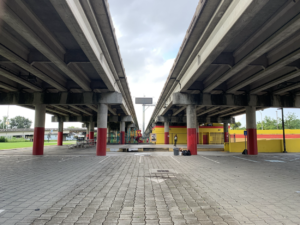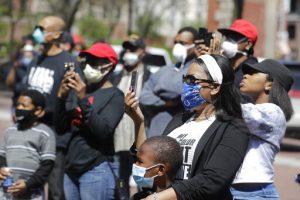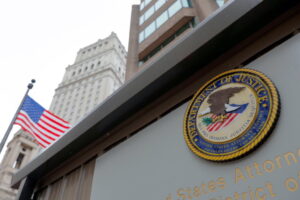As pro-Trump rioters attacked the U.S. Capitol, GOP aide Leslie Shedd helped barricade her office door with a couch and prayed she and her colleagues wouldn’t have to use the two baseball bats they’d found as makeshift weapons.
That’s when the misinformation started pouring in.
As friends and family texted to make sure she was safe, two claimed in separate conversations that the rioters were really left-wing agitators in disguise, not the Trump supporters who’d flocked by the thousands to a rally where the president claimed the election was stolen from him. A third floated a conspiracy theory involving the Capitol Police.
“People online saying it could be antifa dressed as MAGA people,” one friend wrote, arguing it was really “BLM and antifa people” and citing a debunked story that a busload of antifascists had been spotted at the U.S. Capitol.
Shedd, the GOP’s House Foreign Affairs Committee communications director, let him have it.
“I’m locked in my office still and two bombs were blown up within two blocks of my office and like five blocks from my house, and a woman died,” she messaged him. “I really can’t go down the insane conspiracy debunking thing right now. This was MAGA people and Trump supporters 100%. That is a fact.”
Most Americans don’t have a harrowing personal tale from the day of the Capitol insurrection, but anyone with conservative friends and family on Facebook knows that Shedd’s online interactions aren’t all that unusual. One-third of Americans have seen posts on Facebook or other platforms supporting those who stormed into the Capitol, three-quarters of Republicans believe the myth that there was widespread voter fraud in the last election, and a quarter of Republicans at least partly believe in QAnon, according to recent polls. If they’re not willing to hear out a friend who actually works in the government—and personally witnessed the Capitol Hill riots—who will they listen to?
The wake-up call
Shedd used to politely change the topic when friends would float fringe right-wing conspiracy theories, and she usually ignored fringey Facebook posts from high school or college friends from back in her home state of South Carolina. But the attacks on the Capitol were a wake-up call.
“I sat down and thought about what responsibility I have for what happened. What role did I play in January 6 happening? I always tried to be honest and forthcoming with people,” she told VICE News. “I’m a communicator. This is my job. I of all people should use my skill to figure out ways to politely push back on disinformation of any kind, even if that makes me uncomfortable or upsets people.”
Since the Capitol attack, Shedd says she’s had more than a dozen conversations with friends trying to knock down their conspiratorial beliefs. No, the election wasn’t stolen by Democrats. No, the Capitol rioters weren’t a false flag operation. No, QAnon isn’t real.
“I want to throw something out there as someone who works for the federal government and on Capitol Hill and has worked for multiple national and statewide campaigns,” she posted on Facebook on Jan. 27. “Turns out all our lives are generally boring because – spoiler alert – there is NO mass conspiracy within the government. QAnon is a cult.”
“Do you think that I am a pedophile that also eats children?” she continued. “If not, stop listening to anyone who ‘supports’ or claims to be QAnon adjacent or spreads QAnon beliefs to you.”
When some conservatives accused New York Democratic Rep. Alexandria Ocasio-Cortez of exaggerating her own story of surviving Jan. 6, Shedd defended her:
“That’s what it felt like. People were running and making loud noises in the hallway, alarms are going off and any noise you hear is terrifying. They’ve gotten into your building,” Shedd told VICE News in defense of AOC.
Shedd was in the same building as Ocasio-Cortez on the day of the attack. She spent January 6 huddled in her Rayburn House Office Building office with her boss, Texas Rep. Michael McCaul, and a half-dozen staffers. When the building was locked down, they barricaded the main door with a couch and propped chairs against the other exterior doors.
The emergency alarm of the building entrance kept blaring, just down the hallway from their office. They heard banging. At one point, they heard a “mad rush” of yelling people run down the hall outside their office. Shedd isn’t sure if it was cops or rioters. They took in a refugee—a friend of Shedd’s who’d been trapped when the building locked down and was hiding under a set of stairs because they couldn’t get back to their office.
Before she left the office, Shedd posted on Facebook to let her friends know she was safe—and to put on notice the GOP lawmakers who were preparing to vote against certifying the election results.
“To those Members who supported this farce, I hope you seriously look at what happened today. Your words and your actions have consequences. And the violence we have seen today is what happens when people in power purposefully mislead the public,” she warned.
Shedd got home, had a large glass of wine, and passed out. It wasn’t until the next day that the emotional toll of the day hit her, when she burst into tears during a phone call with her parents.
“People who were actually in the Capitol building definitely had a much bigger threat against them and were in a worse situation,” she said. “I’m grateful I wasn’t in the Capitol building. But being locked down in our offices like that, not knowing what’s going on and not knowing what’s going on—it was very, very frightening.”
Shedd is uniquely positioned to convince some people to think harder about their views. She’s a longtime GOP staffer who voted for Trump and has worked on a conservative presidential campaign (Carly Fiorina in 2015), a major Senate race (Ohio in 2018), for a large state party (the Georgia GOP in 2014), and for three conservative Republican congressmen. If her friends aren’t going to listen to the mainstream media, at least they’ll hear her out, right?
“For some people, it probably helps to hear someone like me say these things,” she said.
Experience doesn’t count
But she’s frustrated she’s not making more progress. A lot of the conversations, she said, have been like “beating my head against a wall.” At one point she wrote a three-page email debunking a series of false claims about the election only to have her friend respond with other disinformation. Half of the conversations have been about the election itself, which she thinks Trump lost fair and square, and she’s said they’ve gone nowhere. Few care when she points out her extensive personal experience on campaigns and in government.
“That has been less impactful, in my experience, than saying I was here on Jan. 6, I was personally afraid, I was afraid for myself and my co-workers, and go to work every day in what now looks like a prison with barbed-wire fencing because of this.’ Having them know I was a part of that and them having fear for me has been more powerful at least when talking about Jan. 6 issues than me saying I’m a Republican too,” she said. “That hasn’t been nearly as effective as I thought it would be.”
Two of Shedd’s three friends who’d floated conspiracies on the day of the attacks apologized, but she’s not sure if it was because they realized they were being insensitive or because they accepted they were wrong.
She thinks a lot of people simply won’t accept that Trump lost, no matter what, and that it goes deeper than QAnon or Trump’s falsehoods about massive voter fraud or even problems with social media. She thinks that their basic distrust for institutions—especially the media and the government—has primed them to reject any trustworthy evidence.
Maybe it’s too late to convince some of her friends to check multiple news sites, to cross-reference information, to use basic logic before reposting conspiracies. But she’s going to keep trying.




